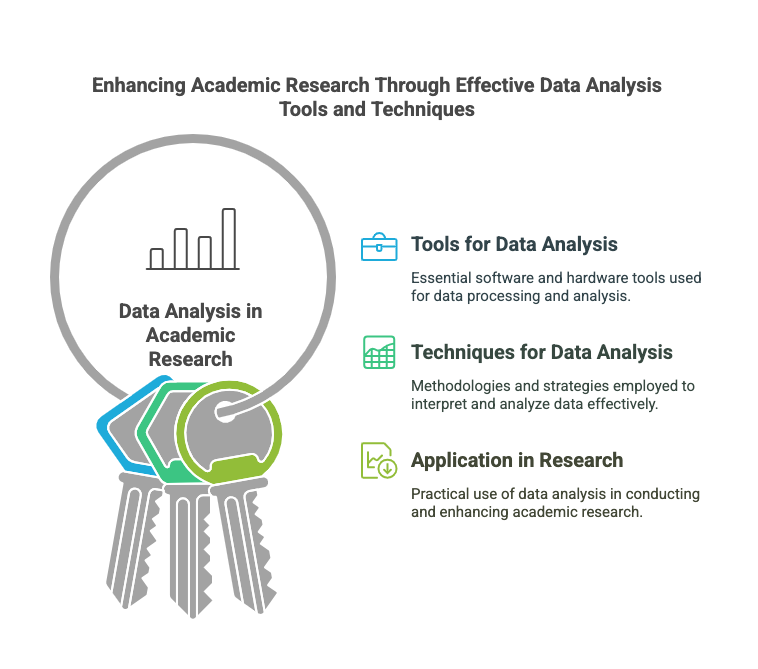The Importance of Data Analysis in Academic Research: Tools and Techniques
 Scribesquad
Scribesquad
Unlocking the Power of Data in Research
In today’s research landscape, raw information alone is insufficient. The ability to interpret and extract meaning from datasets separates intense academic work from mediocre studies. Whether conducting small-scale research or analyzing extensive datasets, data analysis is the key to unlocking valuable insights.
But how can researchers efficiently process data while maintaining accuracy? This article explores essential data analysis techniques, tools, and best practices to ensure that research remains credible and impactful.
Why Data Analysis Matters in Academic Research
A study is only as intense as its analytical foundation. Research from the Harvard Data Science Review found that over 80% of research errors stem from poor data handling. This highlights the significance of a well-structured analytical approach.
Proper analysis helps researchers:
Identify patterns and trends within datasets
Validate or challenge existing theories
Make data-driven conclusions that withstand scrutiny
Minimize bias and inconsistencies
Even the most meticulously collected data can become meaningless without a structured approach.
Key Data Analysis Techniques in Academic Research
1. Descriptive Analysis
This method summarizes data, giving a clear overview of trends, averages, and variability. Researchers use it to present and interpret initial findings before exploring complex relationships.
📌 Example: A study examining student performance might calculate the average test scores across different schools to identify overarching trends.
2. Inferential Analysis
This technique goes beyond summarization to draw conclusions from sample data and apply them to a broader population. Researchers commonly use statistical models such as regression, t-tests, and ANOVA to determine relationships.
📌 Example: A medical study may analyze a sample of patients to predict the effectiveness of a new treatment on the general population.
3. Qualitative Data Analysis (QDA)
Not all research revolves around numbers. For studies relying on interviews, case studies, or open-ended surveys, thematic and discourse analyses help uncover insights beyond raw figures.
📌 Example: A workplace culture researcher might analyze employee feedback to identify recurring themes and concerns.
4. Machine Learning and Predictive Analytics
With increasing access to computational power, AI-driven analytics help researchers detect complex patterns in large datasets. Using traditional methods, machine learning algorithms identify trends that might be difficult to spot.
📌 Example: Climate researchers use AI to predict weather patterns based on vast historical data.
Must-Have Data Analysis Tools for Researchers
Choosing the right tool is just as crucial as selecting the right methodology. Below are some widely used options based on different research needs:
🔹 SPSS – Ideal for statistical analysis in social sciences
🔹 R – A powerful programming language for statistical computing
🔹 Python (Pandas, NumPy, SciPy) – Suitable for complex data manipulation
🔹 NVivo – Perfect for qualitative research and thematic analysis
🔹 Excel – A beginner-friendly tool for basic analysis
🔹 Tableau & Power BI – Great for data visualization
With the right combination of tools, researchers can simplify their workflows and increase the accuracy of their findings.
Avoiding Common Pitfalls in Data Analysis
Even seasoned researchers can fall into analytical traps. Here are some frequent mistakes to watch out for:
🚨 Overfitting Data – Applying a model that fits the current dataset but fails with new data
🚨 Ignoring Missing Data – Neglecting incomplete datasets, which can skew results
🚨 Confirmation Bias – Selecting data that supports a hypothesis while disregarding contradictory evidence
🚨 Misinterpreting Correlation and Causation – Assuming one factor directly causes another when they may just be related
By staying aware of these pitfalls, researchers can enhance the credibility of their work.
Final Thoughts: Strengthening Research with Data Analysis
Data analysis is more than just a technical process—it’s the foundation of valid academic research. A well-executed analysis ensures that findings are reliable and contribute meaningfully to existing knowledge.
Whether you are a seasoned researcher or just beginning your academic journey, mastering data analysis tools and techniques is essential. By leveraging the proper methodologies and avoiding common mistakes, you can elevate the impact of your research.
📢 Ready to refine your research skills? Dive deeper into advanced data analysis strategies and stay ahead in the academic world. Send us a Message Today!!
Subscribe to my newsletter
Read articles from Scribesquad directly inside your inbox. Subscribe to the newsletter, and don't miss out.
Written by

Scribesquad
Scribesquad
Writing is a lifestyle. I am about everything research and technology